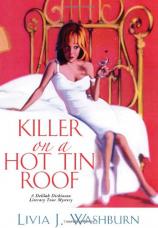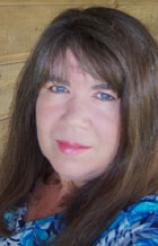Interview: December 3, 2010
Livia J. Washburn’s KILLER ON A HOT TIN ROOF follows literary travel agent Delilah Dickinson --- and several high-strung academics --- as she makes the trek to Tennessee Williams’s New Orleans, only to discover that the celebrated writer might be a phony and that the actual author of “Cat on a Hot Tin Roof” is mysteriously dead. In this interview with Bookreporter.com’s Usha Rao, Washburn reveals why she decided to make Tennessee Williams the subject of her latest Delilah Dickinson Literary Tour mystery and how she came to be so knowledgeable about the festival that’s held annually in his honor. She also speculates on how the “real” Williams of her novel felt about the supposedly authentic playwright and explains why her heroine is so determined to stay single.
Bookreporter.com: What inspired you to make Tennessee Williams’s work the theme of your book? Is he an author you have long been familiar with, or did you learn more about him for KILLER ON A HOT TIN ROOF?
Livia J. Washburn: Tennessee Williams is one of the classic Southern writers --- one of the classic American writers, actually --- and since the first two books in the series dealt with authors who are known primarily as novelists (Margaret Mitchell and Mark Twain), I thought it was time to concentrate on a playwright instead. Over the years, I have seen many of the movies based on Williams’s plays, so I had a general familiarity with his work. But in researching this book, I learned a great deal more about both his work and his life. That’s one of the benefits of being a writer: You have a good reason to be learning new things all the time!
BRC: Is “Cat on a Hot Tin Roof” a play you particularly like? Have you read or watched the play itself, seen the movie, or both? Do you have a preference among these three versions? (I’ve only watched the movie, but your book makes me want to read the original play.)
LJW: I had seen the movie, and I watched it again before writing the book. I also read the play for the first time. I think I prefer the movie because it’s such an iconic piece of cinema, and the cast is just wonderful, but the play is very good, too.
BRC: You write knowledgably about the Tennessee Williams Literary Festival in New Orleans. Did you scout out the festival yourself or read about it, or did your descriptions of the event come from your imagination?
LJW: I planned to attend the festival before I wrote the book, but circumstances made that impossible, so all the material came from research I did online. I took a few liberties for dramatic purposes, but tried to describe the festival as accurately as possible. Of course, as far as I know, it’s never been the scene of a murder!
BRC: What is Howard Burleson’s attitude towards Williams? He seemed nostalgic and resigned to me, not bitter and resentful. Is this the product of Howard’s age, the length of time that has passed since his purported interaction with Tennessee, or just his easy-going personality?
LJW: I think Howard did feel bitter and resentful towards Williams at one time, but the passage of years definitely took some of the edge off those feelings. As I grow older myself, I think age can help a person realize that it doesn’t do anybody any good to hang on to old grudges.
BRC: I found the confrontation between Jake Madison and the panhandler to be interesting. Unfortunately, when many people think of New Orleans, panhandling is one of the things they picture. What was the motivation behind writing that scene: to establish Jake’s character, to describe one of the grittier aspects of New Orleans, or both?
LJW: Definitely both. I’m a firm believer in trying to reveal character through actions, and I like to show both the good and the bad when I’m describing a setting.
BRC: You portray New Orleans in a warm and inviting light. Is this a city you particularly like? What are some of your favorite spots in the city?
LJW: I would love to visit New Orleans someday, but as of now, it’s one of the places I haven’t been to yet. I relied on research and talking to people who have been there to write the book. Also, my daughter, Joanna, had just been to New Orleans, and she read the manuscript and made a few suggestions.
BRC: If you’ve visited New Orleans recently, can you tell us how the city is doing now, post-Katrina?
LJW: Much better, I hope, but I can’t speak from personal experience.
BRC: Is Michael Frasier merely manipulating Howard into revealing his secret, or does Howard himself want some claim to fame after all this time? After all, he does approach Michael first with his story at the bookstore.
LJW: Howard wants the fame and the credit that he believes is due to him. As a writer, I can understand that feeling, although I believe there are much more important things than fame.
BRC: What motivates Delilah to solve crimes?
LJW: Delilah would tell you that it’s not her idea, that she gets stuck in these situations where she has to get to the bottom of some crime in order to save her business. I think she really does have a strong appetite for the truth, though. Her personality is plain-spoken and direct, and she always cuts through the unimportant things to the things that really matter, such as solving a murder.
BRC: To Delilah’s annoyance, the fact that she’s a redhead seems to matter a great deal to some people. Do you see her hair color as an important and relevant character trait, or is it just what her hair color happens to be?
LJW: Writers will tell you that, sometimes, a character just strides into their mind fully formed. That’s the way it was with Delilah. As soon as I conceived of the character, she was all there --- her hair color, her personality, even her name. Such things don’t happen often, but when they do, they’re a blessing.
BRC: In what ways are you like or unlike Delilah?
LJW: I’d like to travel more than I’ve been able to in my life, so I suppose Delilah allows me to do so vicariously. I’m really not much like her, though. She is, however, somebody I’d like to have as a friend.
BRC: As a college professor who is married to another professor, I hesitate to ask this question: Why is Delilah so determined not to be a college professor’s wife? Of course, there are some rather unsavory professor characters in the book, so perhaps that would explain her reticence to mingle with any more people from that profession!
LJW: I think that, because of her fairly recent divorce, Delilah is just a little gun-shy about the idea of getting married again. No matter what the profession of the man she’s interested in is, she can find reasons why she wouldn’t want to be married to him. I can see her getting over that eventually, though.
BRC: What is in store for Delilah next? Will she ever cover literary figures that are not from the South, or will she stay close to her roots?
LJW: There are some other Southern writers I’d like to use as the basis for future books, but sooner or later she will have to branch out more. I can see her leading tours all over the country.
• Click here now to buy this book from Amazon.
© Copyright 1996-2011, Bookreporter.com. All rights reserved.




